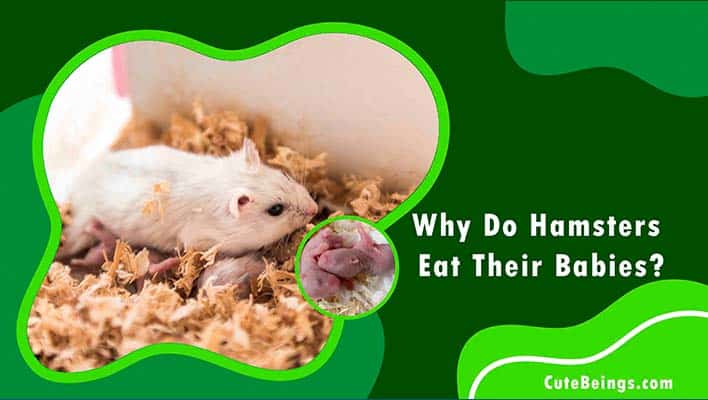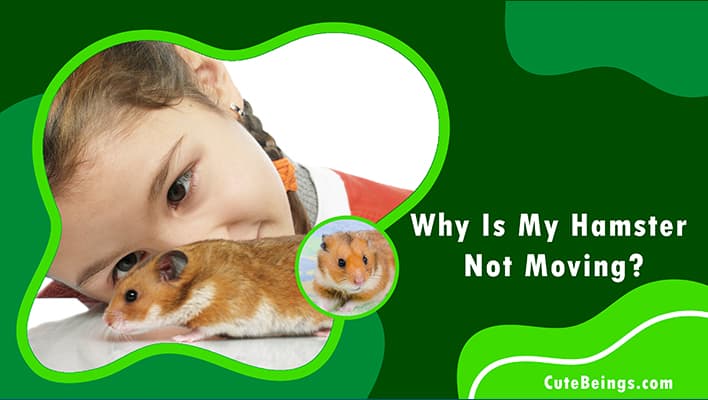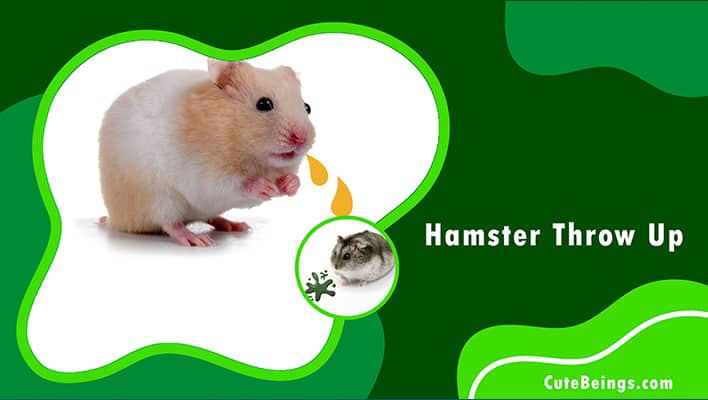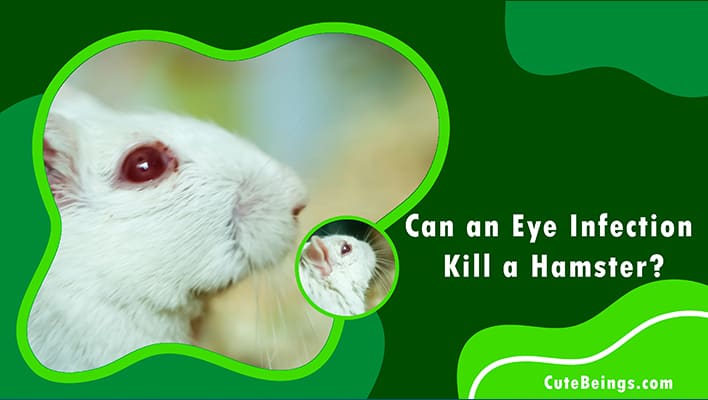If someone asks “Can you really imagine why do hamsters eat their babies?” Well, you will be speechless for a moment. In animal world not all females are good mothers. When raising their children some mothers could be overemotional. They don’t want to be even touched, held or pet when they are expecting babies or nursing.
With hamsters, they are a quite sensitive rodent species but hamster mothers eat or in other word cannibalize their babies occasionally. If you are a hamster owner you might have already witnessed this unfortunate scenery and others may have wondered about disappearing babies mysteriously. This occurrence is quite confusing and upsetting. Let’s discuss what causing this cannibalism and the actions you could take to prevent it from occurring.
Table of Contents
Cannibalism
In zoology, cannibalism is described as eating a fellow animal by another member of the same animal species.
You might think this act is an aggressive move by hamsters but sometimes it is considered as an act of survival and resistance mechanism.
As pet owners it’s your responsibility to identify the hamsters which can be cannibalistic and house your pets properly to prevent this from happening.
Cannibalistic Breeds And Why Hamsters Are Cannibalistic
Hamsters are territorial and that is considered as the reason with hamsters to be cannibalistic. Dwarf hamster and Syrian hamster are known to be cannibalistic against fellow hamsters in the surroundings. In a cage, they are a threat to other hamsters and kill them and eat them. Dwarf hamsters can get along with other mates in the cage sometimes and within a moment they can display an aggressive behavior.
Hamster mothers are also known to eat their stillborn pups and the newborn babies who die after birth.
Roborovski hamster flourishes in colonies, but when these hamsters live in group they need to have enough space otherwise they could become cannibalistic due to overcrowding. In such situation robo hamsters tend to kill young ones so the adult hamsters can survive from starvation. Same scenario applies for the dwarf hamsters as well.
Why Do Hamsters Eat Their Babies?
Stress
Mother hamster can be stressed out just like a human mother after giving birth especially if she is a first time mother. It is very common that being pregnant, delivering babies, nursing and looking after few babies at the same time can be very stressful to anyone including the hamsters. If your female hamster is very stressed after giving birth there is a big possibility that she would eat hamster babies. This can unfortunately occur even when you disturb the mother a lot during the day or if the mother hamster is very young.
Unwell hamster mom
If your hamster feels sick or she can really get sick during the time of giving birth then she will assume that she needs extra nutrients to keep her healthy. In such difficult situations she tempts to eat her babies to get those additional nutrients, energy and the diet.
Insecure environments
When a hamster feels threatened in their surrounding, it feels that its babies are also in danger then she quickly acts to this occurrence by eating the babies rather than letting them suffer. Other pets, a person an even a loud noise can be the reason for a hamster to eat its babies.
Scent mystification
After giving birth female hamster will spend fair amount of time cleaning its babies and leave a scent on each baby so that scent would help mom to recognize its own babies. If she smells a different odor such as human scent on babies hamster mom will fail to identify its babies. Then it would lead to killing its own babies assuming they are imposters because of the change of scent.
Lack of food
Most of the times this becomes the reason for mom to eat its own babies. Due to lack of water and food a mother tend to eat its babies as a pregnant hamster or a nursing hamster is in need of much more energy to her body. So providing more water and food are compulsory if your hamster is pregnant or nursing.
Lack of ability to care the entire litter
When the mother is overwhelmed with its new litter of newborns she might choose the healthiest and dispose the rest which she thinks unnecessary. Hamsters have 12 nipples and if a mother has to feed a large litter then hamsters do this even it doesn’t seem as a good thing do.
A mother will do this for the sake of other newborns so they can survive and a mother will reduce the number of babies until she feels that she is in a position to manage and provide great care for her litter.
Lack of space
Small spaces can make hamsters nervous and a bit scared. If the mother feels that it’s not enough space for taking care of her family she will kill some young ones and make enough room for the other.
Predators
Predators can be attracted to the smell of dead pup or pups in the wild and that some serious risk the mother has to bear. In such occasions mother eat the dead babies to avoid predators and to protect herself and the rest of litter.
Corn based diet
According to a research carried out by Mathilde Tissier at the University of Strasbourg, the humans who consume a corn rich diet can build up a fatal disease called “pellagra”. The same scenario has emerged in hamsters especially in lab raised European hamster. The European wild hamsters that are raised in the lab were provided a corn diet and then the corn fed hamsters displayed some abnormal behaviors.
These abnormal behaviors include cannibalistic behavior and the hamsters that were on a wheat based diet did not show such behavior.
Accidents
Hamster mothers might smother their babies when they nurse them. It is totally unintentional but they could possibly kill or injure a hamster pup when moving them around in their mouth.
When such situations occur mothers eat the dead one so she can get rid of it completely.
Territorial actions
If you are keeping few mothers in the same cage some hamsters tend to eat others babies as a territorial action. This can occur even when you leave the father hamster in the cage.
Can I Save Hamster Pups?
Unfortunately you can’t be there always to save them. But there few things you can do to avoid this from happening.
How To Avoid A Hamster From Eating Its Pups?
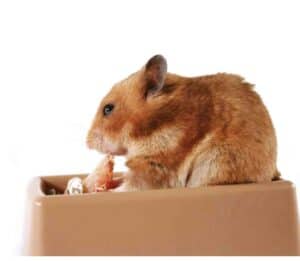
Try following things to prevent hamster mother from eating her babies.
-
Avoid your hamster from getting pregnant if she is not four months old.
-
After giving birth you need to separate male hamster from the mother.
-
Do not feed corn or wheat to your female. Also provide enough food and water and try to offer a well balanced diet which includes veggies, fruits, pellets and make it available at all the times.
-
If you notice any change in mom’s behavior such as not caring for certain ones you can look after them separately.
-
Do not touch newborn babies from your hands, especially from your bare hands and do not move them around.
-
Do not stress out the pet hamster mother by spending too much time around the cage. Avoid taking photos and do not act as excited because these actions could lead the mother to be upset. Limit your looking just to a peek and leave the pups alone at least a week. Upsetting the mother could lead to killing the babies and that is something you don’t want.
-
When your female is about to give birth, place the cage to a quiet and calm place so after giving birth mother can concentrate on babies without any disturbance. Do not let other pets or children to disturb your hamster mother and her litter in any means. Maintain a low volume in your house and it will be a good thing if you can cover the sides of the cage so the mom can’t see any alleged threats.
-
Do not change the environment at least a week after giving birth and avoid trying things which the hamster mother is not familiar with such as loud noises and new scents.
-
Always give enough space to your hamster. If you can provide a cage larger than A3 paper sheet that will avoid the dead babies. Anything smaller than that could result in unfortunate situations.
-
Best choice of cage would be a wood cage with a removable roof because a wood cage can offer maximum shelter and protection to the hamster family and it also provides you an option to peek without disturbing the mother.
-
Prepare a separate hideout so your hamster can bring its babies if she feels any danger in the cage.
-
Keep the hamster cage clean as much as possible even though it’s a very hard thing to do. Hamster mom will be with its babies all the time and provide great sanitization for babies but still they can’t live in a filthy environment.
-
Keep mothers alone with their babies in a cage until the newborns grow up a little. Socialization is very important but first few weeks are extremely sensitive so give some space to them.
Will A Hamster Get Sick After Eating A Young?
Most of the time, the mother will not get sick from eating the babies. It could suffer from an ordinary reaction such as a stomachache.
Though it’s a natural thing, if your hamster shows any difference in behavior seek advice from your veterinarian immediately.
Should I Remove Or Leave The Dead Babies?
If you notice a dead baby hamster, remove it quickly but be very careful not to touch any other babies with your hands. Touching the babies with bare hands could leave a scent on them and that could be a reason for them to be dead. You can use chopsticks, tongs or any method you prefer to remove the dead pup.
Further Reading
Let’s keep reading to learn more about hamsters.

Hello, my name is James and I’ve been caring for tiny pets for over 14 years with a passion. I enjoy passing on my expertise to other individuals in order for them to have the same amount of enjoyment as I do.

